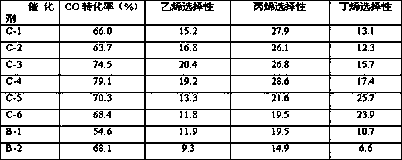A catalyst for producing low-carbon olefins from synthesis gas and its preparation method
A low-carbon olefin and catalyst technology, which is applied in the field of low-carbon olefin catalysts for syngas production and its preparation, can solve the problems of low-carbon olefin catalyst activity and stability, low CO conversion rate, and high catalyst cost, and achieve comprehensive performance. Highlight, improve conversion rate, improve selectivity effect
- Summary
- Abstract
- Description
- Claims
- Application Information
AI Technical Summary
Problems solved by technology
Method used
Image
Examples
example 1
[0023] Weigh commercially available alumina (pore volume is 0.96ml / g, specific surface area is 286.81m 2 / g, the saturated water absorption is 145ml / g, provided by Fushun Branch of Sinopec Catalyst Co., Ltd., the following examples and comparative examples all use the alumina), and the unsaturated spray impregnation method is used to impregnate the nitric acid with a mass fraction of 5%. Zinc aqueous solution, impregnation temperature is 50°C, impregnation time is 3h, impregnation amount is 20% of the amount of saturated absorption solution of the alumina carrier, dried at 120°C for 5h, calcined at 850°C for 6h. The unsaturated carrier after roasting is sprayed and dipped in triethylamine aqueous solution, and the triethylamine aqueous solution spray volume is 35% of the total saturated water absorption of the carrier used, and the mass content of triethylamine in the triethylamine aqueous solution is 8% of the carrier mass, After spray impregnation, dry at 100°C for 5h. Base...
example 2
[0026]Weigh commercially available alumina, impregnate a zinc sulfate aqueous solution with a mass fraction of 10% by unsaturated impregnation method, the impregnation temperature is 60°C, the impregnation time is 2h, and the impregnation amount is 40% of the saturated absorption solution of the alumina carrier, at 90°C Dry at 900°C for 4 hours. The unsaturated carrier after roasting is sprayed and dipped in morphine aqueous solution. The spray volume of morphine aqueous solution is 10% of the total saturated water absorption of the carrier used. The mass content of morphine in the morphine aqueous solution is 2% of the carrier mass. Dry at 90°C for 8h. Based on the final catalyst Fe content of 9wt% and manganese content of 3.6wt%, the carrier for adsorbing morphine was impregnated with a mixed solution containing active metal iron, additive manganese and additive potassium by an equal-volume impregnation method, dried at 100°C for 16 hours, and dried at 550 °C for 4 hours. ...
example 3
[0028] Except that 5% ammonium citrate was added to the impregnated mixed aqueous solution of ferric nitrate and manganese nitrate, the rest was the same as in Example 1, and the prepared catalyst was recorded as C-3, and the evaluation results after 300 hours were shown in Table 1.
PUM
| Property | Measurement | Unit |
|---|---|---|
| specific surface area | aaaaa | aaaaa |
| water absorption | aaaaa | aaaaa |
Abstract
Description
Claims
Application Information
 Login to View More
Login to View More - R&D Engineer
- R&D Manager
- IP Professional
- Industry Leading Data Capabilities
- Powerful AI technology
- Patent DNA Extraction
Browse by: Latest US Patents, China's latest patents, Technical Efficacy Thesaurus, Application Domain, Technology Topic, Popular Technical Reports.
© 2024 PatSnap. All rights reserved.Legal|Privacy policy|Modern Slavery Act Transparency Statement|Sitemap|About US| Contact US: help@patsnap.com








